A Quote by Paul Krugman
I have friends, political scientists, sociologists, who all share an interest at least in certain kinds of science fiction.
Related Quotes
A precondition for being a science fiction writer other than an interest in the future is that, an interest - at least an understanding of science, not necessarily a science degree but you must have a feeling for the science and its possibilities and its impossibilities, otherwise you're writing fantasy. Now, fantasy is also fine, but there is a distinction, although no one's ever been able to say just where the dividing lines come.
Science fiction is a weird category, because it's the only area of fiction I can think of where the story is not of primary importance. Science fiction tends to be more about the science, or the invention of the fantasy world, or the political allegory. When I left science fiction, I said "They're more interested in planets, and I'm interested in people."
There are certain kinds of people who write science fiction. I think a lot of us married late. A lot of us are mama's boys. I lived at home until I was 27. But most of the writers I know in any field, especially science fiction, grew up late. They're so interested in doing what they do and in their science, they don't think about other things.
To me, the amazing thing is that so much that was science fiction back then, political fiction, today is reality. We have indeed a spacecraft called an international space station. And we have the diversity of this planet working on that ship, including Americans and Russians working side by side. I think the imagineers are the ones that set the goal. And the inventors and the technicians see that as a goal to work toward, or the political scientists and the diplomats. And eventually, that's arrived at.
Probably the only people left who think that economics deserves a Nobel Prize are economists. It confirms their conceit that they're doing 'science' rather than the less tidy task of observing the world and trying to make sense of it. This, after all, is done by mere historians, political scientists, anthropologists, sociologists, and (heaven forbid) even journalists. Economists are loath to admit that they belong in such raffish company.
I don't think any administration, when they come in, thinks that their job is to tell the scientists what the science looks like or to be quiet about the science. Scientists need to remain true and not allow science to be politicized. Scientists are not politicians, and no politician should consider themselves to be a scientist.



































